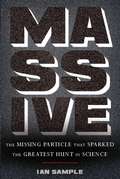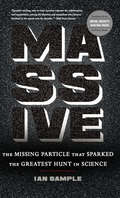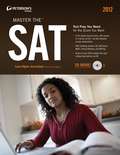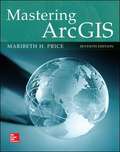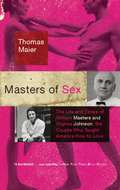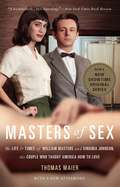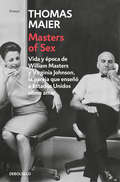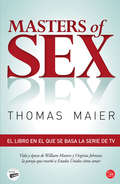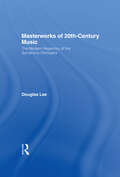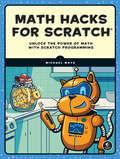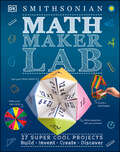- Table View
- List View
Massive
by Ian SampleThe biggest science story of our time, Massive spans four decades, weaving together the personal narratives and international rivalries behind the search for the "God" particle, or Higgs boson. A story of grand ambition, intense competition, clashing egos, and occasionally spectacular failures, Massive is the first book that reveals the science, culture, and politics behind the biggest unanswered question in modern physics-what gives things mass? Drawing upon his unprecedented access to Peter Higgs, after whom the particle is named, award-winning science writer Ian Sample chronicles the multinational and multibillion-dollar quest to solve the mystery of mass. For scientists, to find the God particle is to finally understand the origin of mass, and until now, the story of their search has never been told.
Massive
by Ian SampleA prize-winning science writerOCOs history of the forty-year search for the Higgs boson, and the intense rivalries, clashing egos, and grand ambition that led to a world-changing discovery
Massive: The Missing Particle That Sparked the Greatest Hunt in Science
by Ian SampleThe biggest science story of our time, Massive spans four decades, weaving together the personal narratives and international rivalries behind the search for the #147;God" particle, or Higgs boson. A story of grand ambition, intense competition, clashing egos, and occasionally spectacular failures, Massive is the first book that reveals the science, culture, and politics behind the biggest unanswered question in modern physics#151;what gives things mass? Drawing upon his unprecedented access to Peter Higgs, after whom the particle is named, award-winning science writer Ian Sample chronicles the multinational and multibillion-dollar quest to solve the mystery of mass. For scientists, to find the God particle is to finally understand the origin of mass, and until now, the story of their search has never been told.
Master the SAT Basics: Part I of V
by Peterson'sPeterson's Master the SAT: Basics contains essential information about all aspects of the SAT. Readers will learn about what kinds of questions to expect, how the tests are scored and reported, and how to get ready the night before and day of the test. Peterson's Master the SAT provides students with detailed strategies to help maximize their test scores AND offers hundreds of practice questions to help them prepare for test day. For more information see Peterson's Master the SAT.
Master the SAT Critical Reading: Part III of V
by Peterson'sPeterson's Master the SAT: Critical Reading helps test-takers learn about sentence completion and reading strategies while offering dozens of practice exercises. Readers will learn about the basic steps for solving sentence completion questions and understanding critical reading passages. Peterson's Master the SAT provides students with detailed strategies to help maximize their test scores AND offers hundreds of practice questions to help them prepare for test day. For more information see Peterson's Master the SAT.
Master the SAT Math: Part V of V
by Peterson'sPeterson's Master the SAT: Math gives test-takers essential strategies for multiple-choice and grid-in questions. It includes helpful reviews of numbers and operations, basic algebra, functions and intermediate algebra, geometry, data analysis, statistics, and probability. Peterson's Master the SAT provides students with detailed strategies to help maximize their test scores AND offers hundreds of practice questions to help them prepare for test day. For more information see Peterson's Master the SAT.
Master the SAT Writing: Part IV of V
by Peterson'sPeterson's Master the SAT: Writing provides an in-depth review of the SAT essay. Test-takers will find informative writing strategies, including information on multiple-choice writing questions (identifying sentence errors, improving sentences, and improving paragraphs), an explanation of the writing process and the SAT essay, and a guide to good writing, which includes vocabulary lists of irregular verbs and confusing words. Peterson's Master the SAT provides students with detailed strategies to help maximize their test scores AND offers hundreds of practice questions to help them prepare for test day. For more information see Peterson's Master the SAT.
Master the SAT: Part II of V
by Peterson'sPeterson's Master the SAT: Diagnosing Strengths and Weaknesses contains a diagnostic test designed to help test-takers assess their abilities on the SAT. The test contains critical reading, writing, and math questions-all with detailed answer explanations. In addition, there is a score sheet and a comparison chart to help test-takers pinpoint relative strengths and weaknesses. Peterson's Master the SAT provides students with detailed strategies to help maximize their test scores AND offers hundreds of practice questions to help them prepare for test day. For more information see Peterson's Master the SAT.
Master the SAT: Practice Test 2 of 6
by Peterson'sPeterson's Master the SAT: Practice Test 2 features a full-length SAT exam with detailed answer explanations. The practice test is designed to prepare test-takers for the critical reading, writing, and math questions-as well as the written essays-they will find on the actual exam. Peterson's Master the SAT provides students with detailed strategies to help maximize their test scores AND offers hundreds of practice questions to help them prepare for test day. For more information see Peterson's Master the SAT.
Master the SAT: Practice Test 3 of 6
by Peterson'sPeterson's Master the SAT: Practice Test 3 features a full-length SAT exam with detailed answer explanations. The practice test is designed to prepare test-takers for the critical reading, writing, and math questions-as well as the written essays-they will find on the actual exam. Peterson's Master the SAT provides students with detailed strategies to help maximize their test scores AND offers hundreds of practice questions to help them prepare for test day. For more information see Peterson's Master the SAT.
Master the SAT: Practice Test 4 of 6
by Peterson'sPeterson's Master the SAT: Practice Test 4 features a full-length SAT exam with detailed answer explanations. The practice test is designed to prepare test-takers for the critical reading, writing, and math questions-as well as the written essays-they will find on the actual exam. Peterson's Master the SAT provides students with detailed strategies to help maximize their test scores AND offers hundreds of practice questions to help them prepare for test day. For more information see Peterson's Master the SAT.
Master the SAT: Practice Test 5 of 6
by Peterson'sPeterson's Master the SAT: Practice Test 5 features a full-length SAT exam with detailed answer explanations. The practice test is designed to prepare test-takers for the critical reading, writing, and math questions-as well as the written essays-they will find on the actual exam. Peterson's Master the SAT provides students with detailed strategies to help maximize their test scores AND offers hundreds of practice questions to help them prepare for test day. For more information see Peterson's Master the SAT.
Master the SAT: Practice Test 6 of 6
by Peterson'sPeterson's Master the SAT: Practice Test 6 features a full-length SAT exam with detailed answer explanations. The practice test is designed to prepare test-takers for the critical reading, writing, and math questions-as well as the written essays-they will find on the actual exam. Peterson's Master the SAT provides students with detailed strategies to help maximize their test scores AND offers hundreds of practice questions to help them prepare for test day. For more information see Peterson's Master the SAT.
Mastering ArcGIS (Seventh Edition)
by Maribeth PriceMastering ArcGIS is a detailed primer on learning the ArcGIS software. This book is designed to offer everything you need to master the basic elements of GIS. This seventh edition includes strengthening the data management content and places more emphasis on managing and compiling GIS data, as well as writing metadata. Students these days know less about basic computer file system concepts and they need more background and instruction to work effectively with GIS data. The author has added a new chapter on GIS data management to cover these concepts, and reorganized the chapters to cover data management first, which appears to be the way most instructors like to structure their courses. Metadata is more strongly emphasized throughout, first as the simple Item Description and later as standards-based metadata.
Mastering the Codification and eIFRS: A Case Approach
by Thomas R. Weirich Thomas C. Pearson Natalie T. ChurykChuryk, Weirich, and Pearson's Mastering Codification and eIFRS: A Case Approach is a new accounting book that focuses on teaching students how to use the FASB Codification and the IASB e-IFRS research databases. This is a perfect companion for an Intermediate Accounting, Accounting Research, or Advanced Accounting course, where research skills are integrated in the curriculum. In today's environment, professional accountants conducting financial accounting research will be utilizing some type of electronic research database. Understanding how to use the FASB Codification system is becoming more crucial to a student's success on the CPA exam and their success in the profession. Throughout the text, the authors use cases to step students through the fundamentals of how to conduct research at the professional level.
Masters of Sex
by Thomas MaierIn Masters of Sex, critically acclaimed biographer Thomas Maier offers an unprecedented look at William Masters and Virginia Johnson, their pioneering studies of intimacy, and the sexual revolution they inspired. Masters and Johnson began their secret studies in a small Midwest laboratory, and soon became the nation's top experts on sex. Over the course of more than forty years, they analyzed and explained the secrets of orgasm, emotional fulfillment, and sexual dysfunction. But they divorced after twenty years amid a clash of success, betrayal, and jealousies.Weaving interviews with the notoriously private William Masters and the ambitious Virginia Johnson, Maier offers a titillating portrait of the legendary couple. Entertaining, revealing, and beautifully told, this groundbreaking book sheds light on the eternal mysteries of desire and intimacy, and their complicated roles in the American psyche.
Masters of Sex
by Thomas MaierIn Masters of Sex, critically acclaimed biographer Thomas Maier offers an unprecedented look at William Masters and Virginia Johnson, their pioneering studies of intimacy, and the sexual revolution they inspired. Masters and Johnson began their secret studies in a small Midwest laboratory, and soon became the nation’s top experts on sex. Over the course of more than forty years, they analyzed and explained the secrets of orgasm, emotional fulfillment, and sexual dysfunction. But they divorced after twenty years amid a clash of success, betrayal, and jealousies. Weaving interviews with the notoriously private William Masters and the ambitious Virginia Johnson, Maier offers a titillating portrait of the legendary couple. Entertaining, revealing, and beautifully told, this groundbreaking book sheds light on the eternal mysteries of desire and intimacy, and their complicated roles in the American psyche.
Masters of Sex: The Life and Times of William Masters and Virginia Johnson, the Couple Who Taught America How to Love
by Thomas MaierNow a New Showtime Original Series Showtime's dramatic series Masters of Sex, starring Michael Sheen and Lizzy Caplan, is based on this real-life story of sex researchers William Masters and Virginia Johnson. Before Sex and the City and ViagraTM, America relied on Masters and Johnson to teach us everything we needed to know about what goes on in the bedroom. Convincing hundreds of men and women to shed their clothes and copulate, the pair were the nation’s top experts on love and intimacy. Highlighting interviews with the notoriously private Masters and the ambitious Johnson, critically acclaimed biographer Thomas Maier shows how this unusual team changed the way we all thought about, talked about, and engaged in sex while they simultaneously tried to make sense of their own relationship. Entertaining, revealing, and beautifully told, Masters of Sex sheds light on the eternal mysteries of desire, intimacy, and the American psyche.
Masters of Sex: Vida y época de William Masters y Virginia Johnson, la pareja que enseñó a Estados Unidos cómo amar
by Thomas MaierUn excitante retrato del ginecólogo William Masters y la sexóloga Virginia Johnson, la pareja que cambió la forma en que todos pensamos, hablamos y participamos del sexo. Las investigaciones del ginecólogo William Masters y la sexóloga Virginia Johnson supusieron toda una revolución en la década de los 60. A lo largo de más de cuarenta años, a través de la observación directa de miles de encuentros sexuales entre cientos de hombres y mujeres, analizaron y explicaron temas hasta entonces tabú como los secretos del orgasmo, la homosexualidad, la satisfacción emocional o la disfunción. Thomas Maier ofrece una mirada sin precedentes sobre la pareja que cambió la forma en que todos pensamos, hablamos y participamos del sexo. Reseñas:«Un relato perspicaz y bien escrito sobre Masters y Johnson, que, en un sentido clínico, probablemente sabían más sobre el sexo y el amor conyugal que cualquier otra pareja en Estados Unidos.»Gay Talese «Narrada con paciencia y esmero... Maier escribe bien, y con humor.»New York Times «Una mirada, maravillosamente escrita y totalmente absorbente, a una pareja increíble.»Booklist «El galardonado biógrafo Maier... ofrece el primer examen en profundidad de la compleja pareja que ayudó a revolucionar el estudio de la respuesta sexual humana.»Library Journal «La reveladora biografía de Maier se adentra en la vida de la pareja que inició la revolución sexual.»Discover «Absorbente. Masters of sex es un libro de lectura obligada para aquellos que quieran conocer los embriagadores comienzos de la revolución sexual.»The American Prospect «Puede que debido a su tórrido tema, Masters of sex [...] pueda impactar a algunos lectores por resultar extraordinariamente gráfico tratándose de una biografía, pero este perturbador relato de sexo y ciencia en la teoría y la práctica es en realidad más aleccionador que excitanteO, The Oprah Magazine
Masters of sex
by Thomas MaierThe definitive biography of the famous sex research team who dramatically transformed American sexuality yet whose private relationship was just as complex and dysfunctional as any of their patients
Masterworks of 20th-Century Music: The Modern Repertory of the Symphony Orchestra
by Douglas Lee"Masterworks of 20th-Century Music" introduces more than one hundred of the greatest compositions by world-renowned composer that have entered the standard orchestral repertory. The author surveyed dozens of major American orchestras to focus on those works that an average audience member is most likely to hear. Concertgoers who are intimated by the modern repertoire finally have a single resource that will help them understand and enjoy it. Like an educated guide, he walks the listener through the piece, explaining how all the elements come together to form a unified whole. This book serves the general reader interested in 20th-century music, plus students, teachers, and scholars.
Material Girls: A Novel
by Elaine DimopoulosIn Marla Klein and Ivy Wilde&’s world, teens are the gatekeepers of culture. A top fashion label employs sixteen-year-old Marla to dictate hot new clothing trends, while Ivy, a teen pop star, popularizes the garments that Marla approves. Both girls are pawns in a calculated but seductive system of corporate control, and both begin to question their world&’s aggressive levels of consumption. Will their new &“eco-chic&” trend subversively resist and overturn the industry that controls every part of their lives? Smart, provocative, and entertaining, this thrilling page-turner for teens questions the cult like mentality of fame and fashion. Are you in or are you out?
Maternity & Women’s Health Care
by Deitra Leonard Lowdermilk Shannon E. Perry Kitty Cashion Kathryn Rhodes AldenWith comprehensive coverage of maternal, newborn, and women's health nursing, Maternity & Women's Health Care, 10th Edition provides evidence-based coverage of everything you need to know about caring for women of childbearing age. It's the #1 maternity book in the market -- and now respected authors Dr. Deitra Leonard Lowdermilk, Dr, Shannon E. Perry, Kitty Cashion, and Kathryn R. Alden have improved readability and provided a more focused approach! Not only does this text emphasize childbearing issues and concerns, including care of the newborn, it addresses wellness promotion and management of common women's health problems. In describing the continuum of care, it integrates the importance of understanding family, culture, and community-based care. New to this edition is the most current information on care of the late preterm infant and the 2008 updated fetal monitoring standards from the National Institute of Child Health and Human Development.
Math Hacks for Scratch: Unlock the Power of Math with Scratch Programming
by Michael MaysPush Scratch programming to the limits as you explore primes, Fibonacci numbers, Pascal&’s triangle, and other mathematical curiosities through hands-on coding projects.If you&’re a student looking for project ideas to practice your math and coding skills, or a Scratch enthusiast just looking for something different, this is the book for you!Discover the exciting intersection of mathematics and programming with Math Hacks for Scratch®. This book is perfect for kids, educators, and programming enthusiasts eager to learn or teach math through fun, hands-on projects using Scratch, the popular visual programming language.You&’ll see how a little bit of planning, combined with the right mathematical or coding tricks, can make complex calculations doable. These are the &“hacks&” mentioned in the title. You&’ll write programs to speed up factoring big numbers, sort out a pizza party with Pascal&’s triangle, explore Fibonacci&’s famous sequence for counting rabbits, use cryptography to create unbreakable secret codes, and so much more.Inside, you&’ll find:Step-by-Step Projects: Learn how to create interactive games, animations, and simulations that bring math concepts to life. Convert between binary and decimal to see how computers keep track of numbers. Make sense of patterns in lists, sequences, and arrays. Encode cryptograms, unscramble secret messages, and crack the Caesar cipher.Real-World Applications: See how math is used every day to calculate probabilities in games and create dynamic graphics.Expert Guidance: Benefit from the insights of author Michael Mays, a seasoned math educator with a PhD in mathematics and a 40-year teaching career.Accessible Learning: Ideal for both beginners and experienced programmers, this book offers clear explanations and practical examples that make learning fun and easy.Whether you&’re a beginning coder wanting to enhance your Scratch skills, a teacher looking to inspire students, or a parent supporting your child&’s education, Math Hacks for Scratch provides the tools to turn coding projects into math adventures.
Math Maker Lab: 27 Super Cool Projects (DK Activity Lab)
by DKA fun and engaging STEM activity book for kids that combines creativity and calculations - perfect for budding mathematicians!This is the perfect math exercise book for children interested in the STEM field. Choose between 27 creative projects and experiments that will turn your child into a math whizz! It's the perfect book for curious minds interested in taking the mystery out of math. Explore the exciting world of numbers and math problem-solving! In the pages of this math book for kids you&’ll discover: • 27 hands-on creative projects to engage reluctant mathematicians between the ages of 9-12 • Easy-to-follow step-by-step instructions will show you how to make each project • All materials used can be easily found around your home with no specialist equipment needed • Every project includes an explanation of how math is involved in creating the project or the results of the experiment • Real-world math projects show that math isn&’t just abstract - it has an impact in the real world too! Produced in conjunction with the Smithsonian Institution, SI Math Maker Lab is designed to appeal to math geeks and those that prefer practical projects. To complete these engaging projects, kids don&’t need to be math geniuses or even know how to use a calculator. Each task comes with easy-to-follow instructions, photographs, and illustrations to help whip up super cool mathematics creations!SI Math Maker Lab features interesting activities that cover many aspects of the subject including measurement, geometry, and trigonometry. Kids will combine art and math by learning to draw impossible objects - creating beautiful patterns to make things like a timetable dreamcatcher or perfect the ratio for making refreshing fruit drinks. Each project has an explanatory box that demonstrates how math is applied to the activity to demystify and make math fun!
